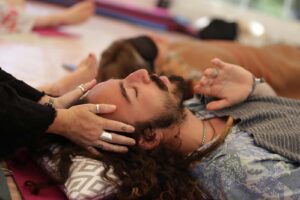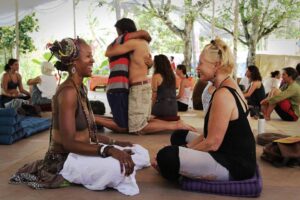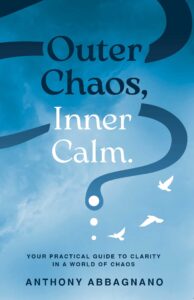Our Felt Sense is our greatest guide in life, it connects us to our inner wisdom, our intuition, and a higher place of knowing. Unfortunately, most of us disconnect from bodily awareness and we lose access to our interior sensations or ‘Felt Sense’ very early on in life (1). Because of this, connecting to the Felt Sense is not something that comes naturally to most adults; it is something that needs to be cultivated through practice. In this article, we will explore what the Felt Sense is, how we can cultivate our Felt Sense and the myriad benefits of doing so.
Defining The Felt Sense
The Felt Sense was first coined by philosopher and psychologist Eugene Gendlin in 1978, in his best-selling book “Focusing.” This is how Eugene described the Felt Sense:
A felt sense is not a mental experience but a physical one. Physical. A bodily awareness of a situation or person or event. An internal aura that encompasses everything you feel and know about the given subject at a given time—encompasses it and communicates it to you all at once rather than detail by detail. Think of it as a taste, if you like, or a great musical chord that makes you feel a powerful impact, a big round unclear feeling.
A felt sense doesn’t come to you in the form of thoughts or words or other separate units, but as a single (though often puzzling and very complex) bodily feeling. (1981, 32-33)
Glendlin continues,
A felt sense is usually not just there. It must form. You have to know how to let it form by attending inside your body. When it comes, it is at first unclear, fuzzy. By certain steps it can come into focus and also change. A felt sense is the body’s sense of a particular . . . situation. . . . It is a body-sense of meaning. (1981,10) (2).
Felt Sense As Medicine
The Felt Sense is all about enhancing body awareness, and this enhanced awareness is a key reason why Breathwork, yoga, TaiChi, Body-Oriented Psychotherapy, Somatic experiencing, and other mindfulness-based therapies and meditations are associated with such a wide range of health benefits (3,4,5,6,7). Perhaps not surprising, preliminary research suggests cultivating bodily awareness can help with a multitude of mental, physical, and emotional health conditions including but not limited to depression, anxiety, obesity, chronic pain, fibromyalgia, musculoskeletal pain, disordered eating, irritable bowel syndrome, sexual abuse trauma, post-traumatic stress disorder, coronary artery disease, congestive heart failure, and chronic renal failure (8,9,10,11,12,13).
Accessing the Body Archive Through the Felt Sense
The body archive is like a huge library of everything we have experienced in this existence. Every memory, action, and reaction in our lives, even those that we have forgotten or blocked out from conscious memory are stored in the body archive. The archive is not something you can access through thinking or willing it however, like any archive, you need to know your way around and have the right keys to access the materials hidden deeply away. The Felt Sense is the key that grants us that access.
Benefits of Connecting to the Felt Sense:
- Gain access to the body archive and tap into the superb wisdom that it holds
- Gain a deeper understanding of yourself, your postures, and your pains
- Understand the language of the body and the messages it is sending you at all times
- Cultivate heightened sensitivity
- Deepen your intuition
- Increase presence and learn to be in the now
- Improve your emotional and relational intelligence and become a better communicator
- Release traumas that are stored in the body in a gentle yet powerful way
- Access your creative channel—the wisdom spring of the universe that exists in each of us
Developing Our Felt Sense Through Alchemy Meditation
The Alchemy meditation is a somatic meditation that helps attune us to our Felt Sense. In Alchemy meditation we practice remaining alert, open, and receptive to any sensation that comes across our field. We give it our full focus, attention, and awareness, without trying to analyze or judge it. Bodily sensations are ever-changing and during the meditation, we watch them as they shift and transform. This is an invitation to move away from the mind and into the body and to connect with our ever-changing sensory, energetic, and emotional landscape.
Alchemy Meditation as a Portal to Deep Healing
When we experience something painful or traumatic, most of us disconnect even further from the body to protect ourselves from the pain. Particularly traumatic events may have even been hidden away from our conscious awareness in order to prevent ourselves from being triggered over and over again. But although the mind forgets the body always remembers, and those traumas are stored in the body archive.
We cannot release stored traumas through talk or will; in order to release them, we need to re-learn how to feel sensations and connect with the body again. When we practice Alchemy Meditation and stay present while sensing basic things, it counters the ‘dissociation’ that happens after trauma. When we learn to connect with our bodies and access the body archive it is possible to finally release the energy of the trauma that has been stored in the body. This is a very gentle yet extremely powerful way to heal from past pains and traumas and it works without you having to re-live or even remember the trauma.
Repetition Is Key
In order for somatic practices such as the Alchemy Meditation to be effective therapeutically, you need to learn how to connect to your Felt Sense and this is best achieved through repetition (14). As we develop sensitivity and learn to listen to the body by using our Felt Sense, we gain access to a wealth of information we don’t normally perceive. With continued practice, we learn to pay attention in a whole new way and begin to operate from our Felt Sense in our daily lives. When this happens you will reap the myriad benefits associated with the Felt Sense and cross the portal into pure potential.
Join Us at Our Free Biweekly Alchemy Meditations
Starting on October 2nd Master of Breath and AoB Facilitator teacher Pablo Castro will be offering free biweekly Alchemy Meditations to our global community. If you would like to experience the benefits of cultivating the Felt Sense for yourself, we would love to have you join us!
✨ For more information and to register to join, please go to: https://alchemyofbreath.com/alchemy-meditation/
References
1. https://www.ncbi.nlm.nih.gov/pmc/articles/PMC3096919/
2. Gendlin, G. (1981). Focusing (p. 33). New York: Bantam New Age Books.
3. Bias control in trials of bodywork: a review of methodological issues.
Mehling WE, DiBlasi Z, Hecht F
J Altern Complement Med. 2005 Apr; 11(2):333-42.
4. Comparing yoga, exercise, and a self-care book for chronic low back pain: a randomized, controlled trial.
Sherman KJ, Cherkin DC, Erro J, Miglioretti DL, Deyo RA
Ann Intern Med. 2005 Dec 20; 143(12):849-56.
5. Daubenmier J. The relationship of Yoga, body awareness, and body responsiveness to self-objectification and disordered eating. Psychology of Women Quarterly. 2005;29(2005):207–219. doi: 10.1111/j.1471-6402.2005.00183.x
6. https://pubmed.ncbi.nlm.nih.gov/16189948/
7. Meditation experience is associated with increased cortical thickness.
Lazar SW, Kerr CE, Wasserman RH, Gray JR, Greve DN, Treadway MT, McGarvey M, Quinn BT, Dusek JA, Benson H, Rauch SL, Moore CI, Fischl B
Neuroreport. 2005 Nov 28; 16(17):1893-7.
8. https://www.ncbi.nlm.nih.gov/pmc/articles/PMC3096919/
9. Randomized, controlled trial of breath therapy for patients with chronic low-back pain.
Mehling WE, Hamel KA, Acree M, Byl N, Hecht FM
Altern Ther Health Med. 2005 Jul-Aug; 11(4):44-52.
10. Randomised controlled trial of Alexander technique lessons, exercise, and massage (ATEAM) for chronic and recurrent back pain.
Little P, Lewith G, Webley F, Evans M, Beattie A, Middleton K, Barnett J, Ballard K, Oxford F, Smith P, Yardley L, Hollinghurst S, Sharp D
BMJ. 2008 Aug 19; 337():a884.
11. Posture, movement patterns, and body awareness in women with chronic pelvic pain.
Haugstad GK, Haugstad TS, Kirste UM, Leganger S, Wojniusz S, Klemmetsen I, Malt UF
J Psychosom Res. 2006 Nov; 61(5):637-44.
12. Efficacy of an acceptance-based behavior therapy for generalized anxiety disorder: evaluation in a randomized controlled trial.
Roemer L, Orsillo SM, Salters-Pedneault K
J Consult Clin Psychol. 2008 Dec; 76(6):1083-9.
13. Metacognitive awareness and prevention of relapse in depression: empirical evidence.
Teasdale JD, Moore RG, Hayhurst H, Pope M, Williams S, Segal ZV
J Consult Clin Psychol. 2002 Apr; 70(2):275-87.
14. https://www.ncbi.nlm.nih.gov/pmc/articles/PMC3096919/





